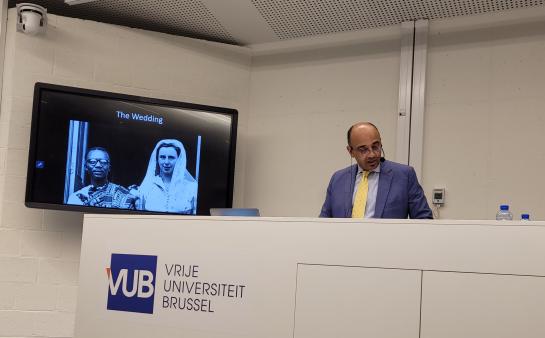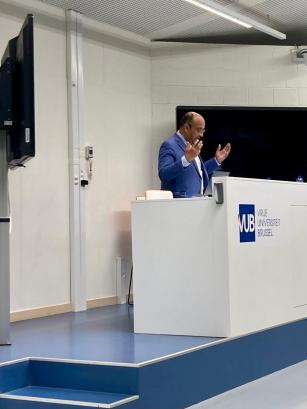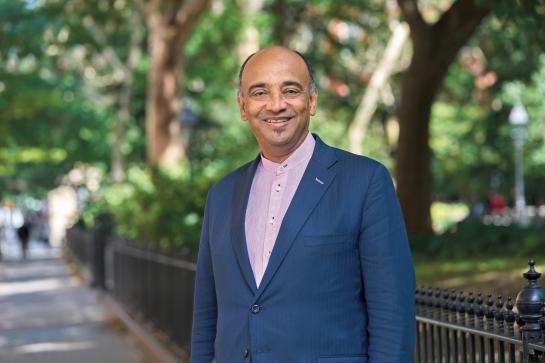
Professor Kwame Anthony Appiah is a much-feted, interdisciplinary public intellectual. Initially coming to prominence in the field of philosophy and ethics, he has held positions in several of the Ivy league universities in his adopted home of the US. He’s currently professor of Philosophy and Law at New York University and has a regular column, The Ethicist, in The New York Times.
Born in London to a Ghanaian father and English mother, Appiah divided his childhood between the former Gold Coast and the UK. His father was a relative of the Asante king and his maternal grandfather was the Chancellor of Exchequer under Clement Attlee’s transformative post-war Labour government.
Prof. Appiah’s acclaimed 2018 book, The Lies that Bind, examines – and problematises - some of the many intersecting strands of which individual and collective identities are apparently formed, within the context of ever fraught socio-political relations.
In June 2024, Prof. Appiah gave the inaugural speech for the Ties That Bind Us lecture series, organised by several research groups at the faculty of arts and humanities at Vrije Universiteit Brussels as part of the university’s public programme.
Tola Ositelu, of the MERLIT research group, caught up with Prof. Appiah ahead of his address to discuss his academic journey from medical student to sought-after public thinker, how cosmopolitanism is misunderstood, the deceptions of meritocracy, building solidarity and why an essentialist approach can sometimes be the pragmatic option.
TO: What was it that motivated you to make the switch from studying medical sciences to philosophy? There seems to have been a digression by way of theology and religious thought…
KAA: I was sick a lot when I was a child and I liked my doctor, which gave me the idea to become one when I was about eight. My parents were happy with that. By early high school, I was part of a group of evangelical Christians, although we were not right wing. We read a lot of theology – which is hard to do without getting interested in philosophy – but it didn’t occur to me to stop my plans of being a doctor. However, when I arrived at university I really didn’t enjoy medical sciences. Everything was wrong with it. You had to get up early to go to the labs and it was taught in a very stultifying way. Pretty early on I asked my university if I could switch. The philosophy don gave me some books to read over the summer and said that if I enjoyed it, I could. And so I did. It was the right thing to do. You shouldn’t spend time on things that don’t really interest you.
TO: It’s fortunate that you kept your horizons open.
KAA: I tell my students that it’s not good to have too settled an idea of what you’re going to do. You should see what the best options are as they come along.
TO: You’re giving an inaugural lecture for the VUB’s and our faculty’s Ties that Bind Us series. In the MERLIT project at the CLIC Centre for Literary and Intermedial Crossings, we take a critical analysis approach to meritocracy as a concept, exploring how it emerges in Anglophone literatures and cultures over time. You also have been rightly critical of the fallacies of meritocracy and the inequalities and stratification it engenders. However, in The Lies that Bind, it appears you do not see the overhaul of hierarchies altogether as a worthy endeavour. Or do you simply think it’s unrealistic?
KAA: I’m not opposed to hierarchies as such. It’s suitable for teachers to be in charge of classrooms as opposed to students. It’s suitable for generals to be in charge of armies and not privates. We need political leaders whom we elect but then we should defer to them in reasonable ways. I don’t think there’s anything intrinsically wrong with hierarchies. Of course, the traditional hierarchies have been the wrong kind. They’ve been on the basis of birth. My main objection to that is that there are better ways of putting people in positions of responsibility. Now, there are many activities where you don’t need hierarchy and so in those contexts, it's inappropriate and wrong.
The meritocratic idea is that you pick the people who have demonstrated that they are best able to do the job. There are nevertheless some things wrong with actual meritocracy. First, a lot of even meritocratic ways of assigning status, assign too much of it. It’s already a privilege to have that kind of authority and status so you don’t have to add more. The judge is entitled to my respect in the courtroom but I don’t have to kowtow to her on the street. I think these hierarchies should be narrowly tailored; domain, talent and qualification-specific.
The other thing is, in the contemporary world, access to the signs of merit is not fairly distributed. If you’re going to have unequal positions, you have to justify departures from inequality. I agree with the basic egalitarian impulse of John Rawls’ liberalism here, in particular. The default should be equality.
What we’ve done in most countries – I can’t think of an exception, although the details are different – is to allow some class of persons to capture access to these special opportunities for their kids. If Princeton University wants a Lacrosse team, the state schools don’t teach it. If you send your kid to a private school and she studies Lacrosse, she has access to an elite education that other people don’t have. Departures from inequality need to be justified as fair and if the system is skewed, then it’s not fair. A properly constructed meritocracy will have task-specific hierarchies and we would honour people who do good things.
TO: Do you mean morally good?
KAA: Not necessarily. One of the things that incentivises people to do well is the fact they’ll be recognised and respected for it. There are these two great economies; money and esteem. They’re both important and useful for mobilising people to do good things. They’re both currently used in ways that motivate people to do bad things, so we need to pay attention.

TO: In the biography on your website, there’s a strong sense of pride in yours and your family’s wanderlust. How does the dispersed nature of your familial ties impact your notion of home?
KAA: I have an enormously privileged background. Both my mother and father’s families chose to be very open to us. Not every English family is like that with a brown relative. And of course, they were also very privileged, ruling class people. I thought of the house my parents built in Kumasi, Ghana as home until I was at university, even though I attended school in England. My grandmother’s house in England was also home, in the sense that I could go there any time I chose and she was welcoming. [In that period], if you’d asked me where my home was, I’d have said Kumasi but I felt at home in my grandmother’s place completely. She was wonderful. I think my mother’s home was definitely her house in Kumasi. She was British but she spoke and wrote Twi and was much loved and very close to lots of people.
If you ask me where my home is now, I’d be a bit divided. I have an apartment in New York and a farm in New Jersey. If I had to give one up, it would be the farm. I think New York is my home and I plan to die there and work there until then [laughs]. It’s where most of my professional life now is. My husband is there and he also grew up in New York state.
I don’t feel deracinated because none of my relatives still live in Ghana anymore. New York is a place that makes it easy for those born elsewhere to ‘come home’. You can become a New Yorker. I think people can have all kinds of relationship to home. It’s not that I don’t understand people who don’t feel at home anywhere. There’s no reason to tie yourself to a geography. There are lots of other things to attach yourself to. You could attach yourself to a family that is distributed. That’s what a lot of Diasporic life is like; African, Chinese, Jewish…people are associated with many places.
I do feel at home in the US. I could have ended up in parts of America where I’d feel like a foreigner forever. [But New York] is a place full of people who came from somewhere else and they’re allowed to say it’s their city. This is different from much of Europe. The natives feel territorial and that they have a right to be there because their ancestors were. That might be a myth. There have always been waves of migration in and around Europe. The idea of being français-e de souche, for example; the real French, German etc. If anyone has that standing in the US it would be the Native Americans, and so everybody else has to admit they’re not that.
TO: You say that ‘most identities involve a form of practical essentialism’. Would you say there are instances where essentialism can be positive, even necessary, to identity formation or otherwise?
KAA: That’s why I wrote a book called The Lies that Bind! One of those lies is a certain kind of essentialism; imagining that all the ‘X’s are the same and they’re different from all the ‘Y’s. However, especially with larger ethno-racial identities, there’s enormous heterogeneity within them. For practical purposes, maybe some essentialism is okay. Put it this way: if people are able to organise some common activity around an idea and that’s a simplification of reality, it’s a bit silly of you to come and say ‘Oh, it’s more complicated than that’. They don’t need the complications to do what they’re doing.
Let’s say there are African-Americans building a church in Ghana. All they need to be is black for that purpose. They don’t need some complicated theory of blackness. You’re just annoying and pedantic if you fuss about that.
If somebody claims something is untrue, it’s always appropriate to ask ‘does it matter in this context?’. I’m really committed to that. In practice, what matters is the message people get. Now, the difficulty with the essentialism of many identities is that if you think you have many things in common already, you might not do the work to build solidarity. You might just assume ‘we’re all black, so it’s fine’. That’s not going to work because solidarity always has to be built.
There are all these essentialising ideas about diverse Africans. If the issue is how we vote in the UN, then maybe all that matters is that we are Africans and we’re all on one continent with shared ecological interests. On the one hand, if you’re intellectual, you want to get it right but for practical purposes, you just want to get it right enough. It’s only when the simplification is getting in the way that we need to point it out.
TO: You describe cosmopolitanism as ‘universality plus difference’. However, the word can also be perceived as having elitist connotations. In his 1995 book Blood and Belonging, the historian Michael Ignatieff claimed that ‘...cosmopolitanism is the privilege of those who can take a secure nation-state for granted’. Perhaps you disagree. Would you say the word cosmopolitan(ism) brings with it a type of baggage? Does your definition seek to repurpose it?
KAA: Certain kinds of cosmopolitan practice are easier if you have money and the privilege of a certain kind of passport, for example. But lots of things are easier if you have these things. That’s not an argument against them. I think everybody should have money and a good passport. If not having those things gets in the way of exercising a cosmopolitan spirit, I’d like the world to change.
But it’s not true, just as an empirical matter, that the cosmopolitan attitude is something that’s limited to privileged people. There’s what I call “Platinum Frequent Flyer Cosmopolitanism”. Yet, if you listen to people talking in refugee camps in Kenya or Palestine, some of them are cosmopolitan and some of them aren’t. Some of them are interested in music and films from everywhere and not just their country of origin.
TO: So, according to you cosmopolitanism is a state of mind?
KAA: Fundamentally, it has to do with an attitude of engagement across difference. It’s condescending to the non-privileged to think they can’t have that, since some of them do. Some of them don’t but then, lots of elite people don’t have that attitude. A lot of Platinum Frequent Flyers are not cosmopolitan. They go from the Hyatt Regency in Rio to the Hyatt Regency in Hong Kong to the Hyatt Regency in Mumbai. They don’t go out on the street, they don’t mingle or learn anything.
[Cosmopolitanism] is fundamentally an attitude and one you can find anywhere. Exercising this attitude depends on your resources, of course, including your political resources i.e. having a ‘strong’ passport or secure state.
The universal declaration [on human rights] says that everybody has a right to a nationality. The world has stateless people. That’s a violation of their rights. Somebody ought to give them a passport. If nobody is going to then there’s something wrong with the world, not with them.
Precisely, irregular migrants are people on the move. It may be they’re being pushed by a bad situation at home or pulled by opportunities elsewhere.… Reasons vary but part of it is because they’re actually interested in being somewhere else. And that doesn’t mean that they’ve lost a connection with the place they came from. A cosmopolitan isn’t someone who abandons somewhere in order to loosely connect with everywhere. The idea that cosmopolitans have to be hostile to their homes, that’s a mistake.
The first person who used the word cosmopolitan in Greek, as far as I know, was Diogenes of Sinope. He was a street dweller in exile in Athens. So I don’t think it’s a matter of means. That’s neither necessary nor sufficient. [The cosmopolitan] attitude strikes me as one that you could have without much in the way of power and resources, and a lot of people do. If there’s ‘Frequent Flyer Cosmopolitanism’ then there’s ‘Refugee Camp Cosmopolitanism’.

TO: Like many public thinkers and commentators, you’ve expressed concerns about the divisiveness of contemporary societies. Yet, as you’ve acknowledged elsewhere, divergence is also a necessary part of arriving at the common good. According to the political theorist, Chantal Mouffe: ‘...What is important is that conflict, when it arises, takes the form not of an “antagonism” …but of an “...agonism...”…The opponent is considered not an enemy to be destroyed but an adversary whose existence is perceived as legitimate...”. Would you thus say that the problem is not so much divergence per se, as not knowing how to disagree well; the animus and polarisation? If this is the case, as an ethicist how would you suggest we resolve this?
KAA: Liberalism, in the sense of Rawls’ theory of justice, assumes societies will consist of fellow citizens who’ll have different conceptions of the good life. That’s an inescapable feature of life. We’re not going to come round one day to all agreeing about these things. Once you’ve accepted that, then you have to ask; how can we organise as a society that works for us all? That involves not believing I have to win every battle. It won’t work for others if I always win. I have to be willing sometimes to concede; not to lose but to give stuff up. “Winner Takes All” politics has no chance of working, once you grant that we’re going to live in societies where we disagree deeply about all the things people might be.
Against that background, it’s crazy not to try to find ways of accepting that you’re going to be living with plurality. Sometimes people don’t like the word toleration. It comes from a Latin root meaning ‘I’m bearing with you’. Yet, the fact is sometimes that is what I’m doing. Being willing to say, ‘this is my view of the perfect world but it’s not yours. Let’s see if we can make a world that is habitable for both of us’, that’s essential for any kind of politics. Even without democracy, you’re going to have people living together. What you have to agree on is what to do. You don’t have to agree on the why.
There are lots of compromises- and it’s not a bad word in democratic politics. A compromise is something which at the end, almost everybody accepts the outcome. They don’t have to agree on why they’re accepting it. The idea that democracies are about majorities is a terrible one. Democracy is about everybody. And so, I’ll be willing to have things happen that I don’t want to because I want to bring others along. In return, they’ll bring me along when they’re in the majority. If you just think ‘We’ve got 50% + 1 so we can do what we like’, that’s not the democratic attitude. Rather, it is that everybody matters.

TO: Notwithstanding some notable exceptions, it appears that ethics is not nearly as strong a consideration as it should be in public discourse; around contentious subjects like reproductive rights and the proliferation of AI, for example. Perhaps ethics is associated with moralising and seen as problematic. Do you also believe there’s a dearth of ethical consideration in the public square? If so how, in a world of social media echo chambers, do we revive these traditions?
KAA: People do raise relevant ethical issues about AI. There was a proposal [in the US] to use AI around parole decisions. Because it tends to reproduce the average, it turned out to be even worse for black potential parolees than the better judges. People did and are thinking about the ethics around job loss and so on. They have all along. We had debates about this around the time of the industrial revolution.
One part of the difficulty is about how people use the word ethics or even perhaps morals. I think in the English-speaking world (and this is not so true in French or German), if you say morals to people, the first thing they think about is sex. Actually, that’s a very small part of morality. It only has to do with a very narrow range of human interactions. Another part of the problem is a particular background assumption. It is that we live in morally pluralist societies, so an appeal to a moral idea is just inevitably controversial. In political argument, you want to avoid controversy. You want to get as many people as possible to agree with you.
TO: That depends on the political actor. Some are happy to court controversy more than others…
KAA: Yes, but it’s all in the service of winning. Sometimes the best way to win is to be uncontroversial. I myself am not that kind of moral relativist. I think there are correct kinds of moral questions and that some communities are just wrong about certain things, including some communities I belong to. I am nonetheless tempted by the thought that we shouldn’t try and settle grand moral questions if we don’t need to, for the practical purpose at hand. That’s the job of philosophers; we work on that and think about these things.
TO: But if it's delegated to a rarefied set, that’s not very democratic…
KAA: I’m not saying philosophical debates are how society decides. I’m actually sceptical of the idea of moral expertise. If what’s at stake is a moral question, then we just have to discuss that and try to see if we get enough consensus around the relevance of the moral issues to come to an agreement. Sometimes we can’t. I actually think the question about abortion, for instance – only one amongst many other reproductive rights – is a genuinely difficult one.
[In the US] there seem to be people who think only the rights of foetuses matter and others who think only the rights of womb-bearers matter. I think the evidence in the polling is that most people are in the middle. They understand the arguments on both sides. They think this is one of those places where a compromise is needed but the politics isn’t producing one. It’s either one side or the other. Regular people don’t think those who are disagreeing with them are wicked. They just think they’re mistaken. Yet, the only well-represented positions are the ones that characterise the other side as evil.
There’s a tradition in American liberal theory that you should only use what Rawls called ‘Public Reasons’ in the political sphere; reasons that can appeal to the overlapping consensus amongst almost everybody. I think that’s a bad idea of democracy. I want to know what motivates my fellow citizens, even if I don’t agree with them. I don’t want them to pretend they care about this, when what they really care about is that. I’m happy for people to make any arguments they like. On the other hand, they have to recognise – given the inevitably plural character of modern societies – that some arguments they make won’t land. As long as people accept that, I don’t mind them telling me. I like these discussions. You learn things.
TO: Reading through your New York Times The Ethicist archive, you clearly take pains to write with emotional intelligence. This also comes through in your thoughts on the role of Religion or Faith for much of the world’s population. Would you say emotional intelligence is a pre-requisite for being a good ethicist?
KAA: [Long pause] I’m not always clear what people mean by emotional intelligence. There’s a lot of scepticism in the scientific community about exactly how to use the idea. Practical wisdom, sensitivity to how things are for people, humanity… those things are very important for advising people about practical ethics. There were some great moral theorists who were not good at that. They had something else to contribute. You can be a very good ethicist and not have that practical humanity. It’s just a division of labour. You wouldn’t want to ask advice of that kind of ethicist but they might make a contribution to philosophical understanding.
The interview with Prof. Kwame Anthony Appiah was conducted on 24 June 2024 at VUB, prior to his lecture Speaking of Identity. His visit was initiated in collaboration of the CLIC, SHOC and VISU research groups at the Faculty of Arts and Humanities at VUB as part of their jointly organised series Ties that Bind Us. Prof. Appiah’s visit was co-funded by MERLIT, and hence by the European Union. It was enabled by a collaboration with Pépite Blues bookshop (Brussels), stimmen afrikas e.V. (Cologne), Global South Studies Centre Cologne, the University of Cologne (English Department) and the Bonn Centre for Dependency and Slavery Studies.
A more extensive, two part version of this interview also features on Afropean.com.
All images: (c) MERLIT, except for final: (c) NYU
